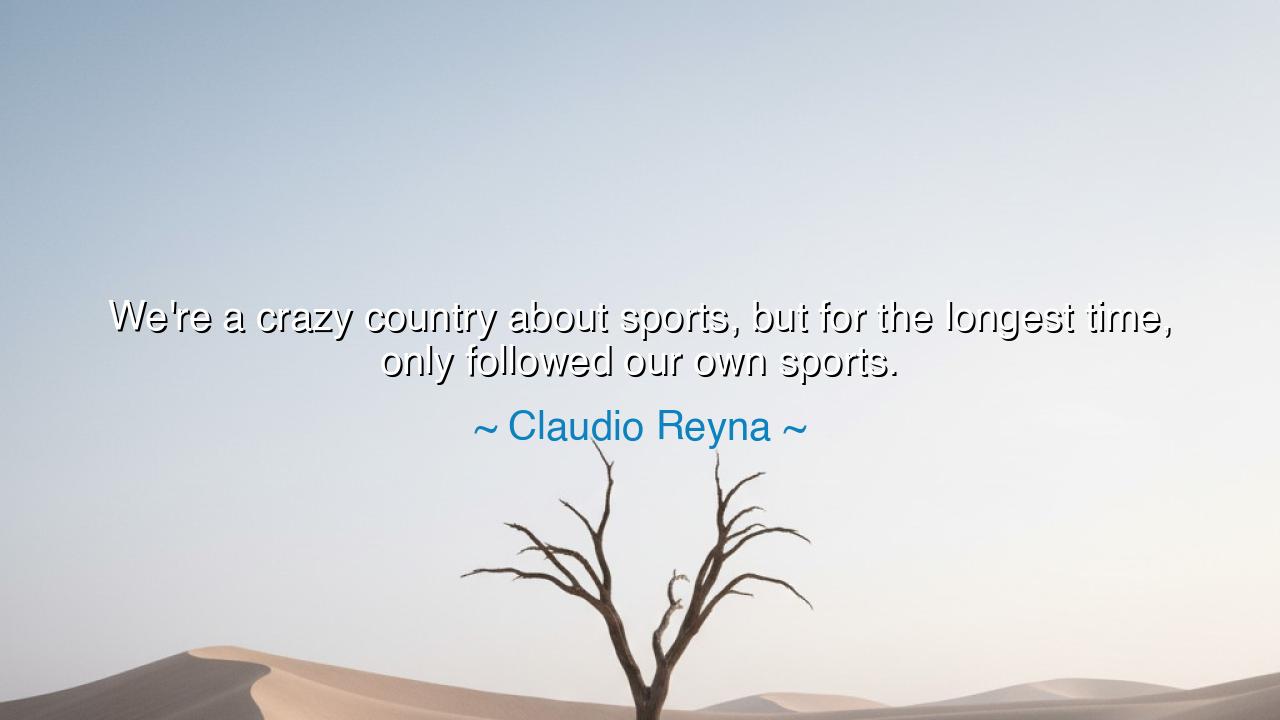
We're a crazy country about sports, but for the longest time
We're a crazy country about sports, but for the longest time, only followed our own sports.






Claudio Reyna once said, “We’re a crazy country about sports, but for the longest time, only followed our own sports.” These words strike at the heart of a nation’s identity, exposing both its passion and its limits. They remind us that America, a land overflowing with athletic fervor, has long celebrated games of its own creation—baseball, football, basketball—while turning away from the great contests embraced by the wider world. Reyna, a warrior of the global field of soccer, saw clearly the paradox: a people burning with devotion to sport, yet blind for generations to the world’s most universal game.
The meaning of his words is layered. To be a crazy country about sports speaks to the fiery energy Americans pour into their games: stadiums filled with tens of thousands, children raised with balls in their hands, lives ordered around seasons of competition. Yet the second half of his truth carries weight—“only followed our own sports.” This reveals a kind of isolation, a cultural pride that built walls around its playing fields. It is as if a mighty kingdom raised monuments to its own gods, yet ignored the temples of others. The passion was real, but it was narrow, self-contained.
The ancients too knew such limits. The Greeks, whose Olympic Games became the seed of world competition, first held contests only among themselves. To them, outsiders were “barbarians,” unworthy of their sacred games. It was only centuries later that sport became a bridge across nations. In the same way, Reyna points out that America, for much of its history, exalted its own games, while the game beloved by the rest of the world—football, or soccer—was treated as foreign, unworthy of the same reverence.
History offers us vivid examples. In 1994, when the United States hosted the FIFA World Cup, many doubted the land of baseball and football could ever embrace the global game. Yet the event drew massive crowds, and a seed was planted. Children who grew up watching that tournament became the players and fans who helped soccer flourish decades later. Claudio Reyna himself was among the pioneers, carrying the banner of American soccer into international arenas. His words reflect the struggle of opening a nation’s eyes beyond its borders, teaching that sport is not only a mirror of culture but a bridge between worlds.
The emotional weight of his observation lies in the tension between pride and humility. To love one’s own games is natural; they are the songs of one’s homeland, passed down through generations. But to believe they are the only games worth playing blinds the spirit to the wider human family. In truth, sports are a universal language, spoken across continents, connecting strangers with a single cheer, a single goal, a single heartbeat. By clinging only to their own, Americans risked isolation from a joy that unites billions.
For the seeker of wisdom, the lesson is luminous: greatness comes not from clinging to one’s own traditions alone, but from opening to the traditions of others. To celebrate both your native games and the games of the world is to live larger, to share in the common heritage of humanity. Just as music, art, and story are enriched by diversity, so too are sports made fuller when we embrace not only what we know, but what others treasure.
What then must we do? Love our own sports, yes—but also learn to love the games of others. Attend the soccer match, watch the cricket test, witness the rugby scrum. Teach children not only to honor the heroes of their homeland, but to admire the champions of distant fields. In this way, sport becomes more than entertainment—it becomes a force for unity, humility, and global kinship.
Thus, Claudio Reyna’s words echo with timeless wisdom: a nation crazy for sports must not confine its vision. For the field is larger than one country, and the joy of the game belongs to all. When we open our hearts to the world’s contests, we discover that beyond the borders of our own fields lies not foreignness, but brotherhood. And in that brotherhood, the true spirit of sport is fulfilled.






AAdministratorAdministrator
Welcome, honored guests. Please leave a comment, we will respond soon